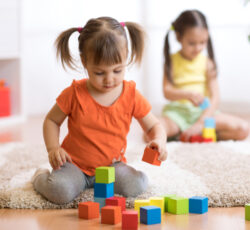 The Importance of Play: Exploring Different Types of Play for Child Development
The Importance of Play: Exploring Different Types of Play for Child Development
Play is an integral part of every child’s life. It is not only enjoyable but also plays a crucial role in their overall development. From cognitive and physical development to emotional and social skills, play helps children grow and learn in various ways. In this blog post, we will dive into the different types of play and understand how each type contributes to child development.
1. Physical Play:
Physical play involves activities that enhance a child’s gross motor skills, coordination, and physical fitness. Running, jumping, climbing, and playing outdoor sports are some examples of physical play. This type of play helps children improve their balance, strength, and flexibility. Moreover, physical play contributes to their cardiovascular health and overall physical well-being.
2. Imaginative Play:
Also known as pretend play or make-believe play, imaginative play involves creating scenarios and acting them out. It could be playing house, pretending to be a superhero, or simply role-playing with toys. Imaginative play encourages creativity, problem-solving skills, and the ability to think abstractly. Children learn to use their imagination, explore different perspectives, and develop their language and communication skills through this type of play.
3. Constructive Play:
Constructive play involves using materials and objects to build or create something. It could be building blocks, puzzles, clay, or Lego. This type of play encourages children to problem-solve, develop fine motor skills, and enhance their spatial reasoning abilities. Constructive play also fosters critical thinking and helps children understand concepts like cause and effect, weight, and balance.
4. Social Play:
Social play involves interaction and communication with other children. It includes cooperative play, where children work together towards a common goal, and competitive play, where children engage in games and activities that involve winners and losers. Social play helps children develop social skills, such as sharing, taking turns, and resolving conflicts. It also promotes empathy, understanding, and collaboration. Through social play, children learn essential life skills that are necessary for healthy relationships and integration into society.
5. Sensorial Play:
Sensorial play involves engaging the senses and exploring the world through touch, smell, taste, sight, and sound. It could be playing with sand, water, or sensory bins filled with various textures and materials. Sensorial play helps children develop their sensory perceptions, fine motor skills, and language development. It enhances their ability to observe, differentiate, and communicate their sensory experiences. Sensorial play also provides a calming and soothing effect, helping children regulate their emotions and reduce stress.
6. Outdoor Play:
Outdoor play is vital for a child’s overall development. It allows children to engage with nature, explore their surroundings, and experience the benefits of physical activity. Playing outdoors enhances their physical fitness, Vitamin D levels, and strengthens their immune system. It also provides opportunities for creativity, imagination, and problem-solving. Outdoor play promotes environmental awareness, appreciation for nature, and a sense of adventure.
Conclusion:
Play is a fundamental aspect of child development that should never be underestimated. It contributes to cognitive, physical, emotional, and social skills in various ways. By understanding the different types of play, parents, caregivers, and educators can create an environment that fosters holistic development. Encouraging children to engage in physical, imaginative, constructive, social, sensorial, and outdoor play will lay the foundation for their lifelong learning journey. So, let’s prioritize play and provide children with opportunities to explore, learn, and grow through these different types of play.
Got Questions? Let Us Help!
At Happy Hearts on the Hudson our goal is to establish an environment rich in self-expression and self-confidence. Where every child learns the importance of responsibility, decision making, and respect for others. We are a family-owned business caring for children from 6 weeks old to 12 years old. Our teachers strive to develop the children’s skills by engaging their hearts as well as their minds. For fun, care, or child education feel free to stop by or give us a call today!
